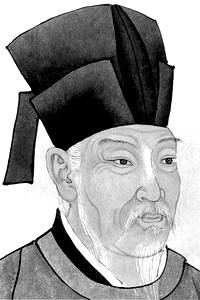 Born in the Tang Dynasty in 772, Bai Juyi was an official of the government and also one of the most famous poets of the age who is still widely read today mainly because of his highly readable style. Bai Juyi lived through an age of political upheaval with no less than 8 emperors coming to the throne during his life time. His two most well-known poems were Song of Everlasting Regret and The Song of Pipa Player.
Born in the Tang Dynasty in 772, Bai Juyi was an official of the government and also one of the most famous poets of the age who is still widely read today mainly because of his highly readable style. Bai Juyi lived through an age of political upheaval with no less than 8 emperors coming to the throne during his life time. His two most well-known poems were Song of Everlasting Regret and The Song of Pipa Player.
He was born in Shanxi but brought up for the main part in Henan, his family close to poverty most of the time but dedicated to education and scholarly pursuits. When another war started in his 10th year, Bai Juyi was moved to Xuzhou where he stayed with relatives.
In 800 he undertook and passed the Jinshi, an examination that was a prerequisite to working in government, and in 806 he was promoted to a minor civil service position in Zhouzhi and became a member of the Hanlin Academy. He held another position of assistant secretary after the death of his mother and seemed settled, though things were about to change.

In 814 he made the mistake of nurturing some more powerful enemies in the court, partly because of a couple of long poems he had written, including On Stopping the War. Another poem poked fun at the avarice of local officials whilst lamenting the lot of the average city inhabitant. After a failed assassination attempt on the prime minister, Bai Juyi hastily wrote a memorial for the Emperor which was roundly criticized.
He was also vilified for writing some poems on the death of his mother that were said to lack filial piety which was extremely important at the time. This led to a period of exile where he was demoted and sent out to the provinces, something which Bai Juyi seemed to take in his stride. He was invited back a couple of years later where a new, more corrupt emperor was now in power. Bai Juyi hadn’t learned his lesson and wrote a number of poems that criticized the court and was again sent off on his way.
This time, however, he became the governor of Hangzhou and busied himself with a number of construction projects including building a dam at the West Lake. When his time as governor had passed, in 824 he was given the rank of Imperial Tutor and, a year later, was posted as governor to Suzhou but later became ill and had to retire from service.

He lived in semi-retirement for much of the next fifteen years, undertaking a number of lower prestige appointments but in 832 found some impetus to help restore the monastery at Longmen. A few years later he suffered a seizure that left him partially paralyzed and he spent the next period of his life organizing his large number of poetic works. Over his career he wrote some 2,800 poems which are noted above some of his contemporaries in their accessibility to people of all social standings and are still highly readable today.
Bai Juyi died in 846 at the age of 74 and was buried in a plain grave at the monastery in Longmen.

